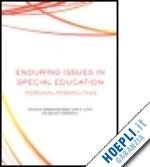Foreword David Chard Preface Chapter 1: Introduction: Does Special Education Have Issues? Tankersley, Lloyd, & Bateman Section 1: What is Special Education? Chapter 2: What is Special Education? Bateman, Lloyd, Tankersley, & Brown Chapter 3: What Makes Special Education Special? T. Scruggs & M. Mastropieri Chapter 4: What is Special Education Instruction? P. C. Pullen & D. P. Hallahan Chapter 5: What Should We Teach Students with Moderate and Severe Developmental Disabilities? D. Browder Chapter 6: Special Education as "Specially Designed Instruction": Ode to the Architecture of Information and the Message Kame’enui Section 2: Who Should Receive and Provide Special Education? Chapter 7: Who Should Receive and Provide Special Education? Bateman, Lloyd, Tankersley & Driver Chapter 8: Cultural and Linguistic Diversity in Special Education J. Klingner, B. Moore, A. Davidson, A. Boelé, A. Boardman, R. Figueroa , S. Annamma, N. Sager Chapter 9: Who Should Receive Special Education Services and How Should Educators Identify Which Students are to Receive Special Education Services? E. Lembke Chapter 10: Co-teaching: Not All Special Educators Should Dance M. P. Weiss Chapter 11: Who Makes a Difference! Next Generation Special Education Workforce Renewal M. Rock & B. Billingsley Section 3: Where Should Special Education Happen? Chapter 12: Where Should Special Education Take Place? Bateman, Lloyd, Tankersley, & Alves Chapter 13: Where Should Students with Disabilities Receive Their Education? N. Zigmond Chapter 14: Placements for Special Education Students: The Promise and the Peril D. Huefner Chapter 15: Place Values: What Moral Psychology Can Tell Us About the Full Inclusion Debate in Special Education A. Wiley Section 4: How Should Special Education be Practiced? Chapter 16: How is Special Education Practiced? Lloyd, Tankersley, Bateman, & Hirsch Chapter 17: How Should Evidence-based Practices be Determined? B. Cook Chapter 18: The Connection between Assessment and Intervention: How Can Screening Lead to Better Interventions? K. Lane & H. Walker Chapter 19: How Should Learning Environments (Schools and Classrooms) be Structured for Best Learner Outcomes? C. Greenwood Chapter 20: How Should We Evaluate Whether Special Education Works? M. Thurlow Section 5: When Should Special Education Begin and End? Chapter 21: When Should Special Education Start and End? Bateman, Lloyd, Tankersley, & Dillon Chapter 22: Children Should be Identified and Receive Special Education Services in Early Childhood J. Carta Chapter 23: When Does Special Education End? M. Wehmeyer Section 6: Why Do We Have Special Education? Chapter 24: Why Should We Have Special Education? Lloyd, Tankersley, & Bateman Chapter 25: Why We Should Have Special Education J. Kauffman Chapter 26: How Should We Pay for Special Education? T. Parrish Chapter 27: Science Matters in Special Education T. Landrum Section 7: Whither Special Education? Chapter 28: Whither Special Education? Lloyd, Tankersley, Bateman, Balan, & Lloyd Index











